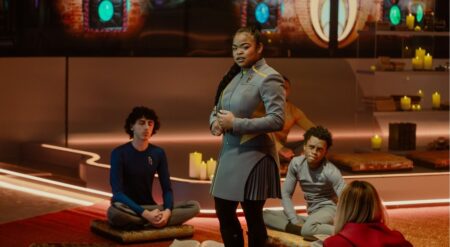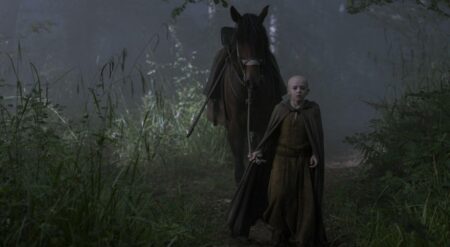
The adaptation to Isaac Asimov’s Hugo award-winning series is finally upon us. The story was originally penned in the ’40s and ’50s as a short story but was later broadened into a full trilogy with two subsequent stories added in the 1980s. Foundation Season 1 is a cosmically large weekly sci-fi series coming exclusively to Apple TV+ as an original.
David S. Goyer serves as the showrunner, writer, and executive producer, and the series boasts a cast that includes Jared Harris (Hari Seldon), Alfred Enoch (Raych), Lou Llobell (Gaal Dornick), Lee Pace (Brother Day), Terrence Mann (Brother Dusk), and Leah Harvey (Salvor Hardin).
Foundation is a science fiction story in which one man predicts the coming fall of the Empire that has ruled over the galaxy for a considerable period of time. The man is Professor Hari Seldon, the galaxy’s foremost expert of psychohistory, a type of predictive societal math that takes into account what’s been, in order to assess what will come next. What Professor Seldon has found in the math is the coming fall of the current power, and in that panic, a cosmic dark age that will last for a few thousand years. While the numbers show there is no way to avert this catastrophe, he does propose a beacon of light that will reduce the darkness. A vault of intelligence, a catacomb of information, a warehouse of data that will enlighten future generations and help them rebuild. A Foundation of knowledge.
I was lucky enough to have watched all of Foundation Season 1, and the themes and plots that are portrayed are really fascinating and highly relevant given events in society today. What truly blows my mind into tiny little pieces is that this story and these details were conceived by one writer, Isaac Asimov, nearly 80 years ago.
The show naturally delves into the battle between chaos and control, math and science against belief, human kind against the nature of the universe. I am a person that actually quite enjoys data and interpreting that data in a way that creates a picture of events. So Foundation really spoke to me with the indisputable fact that math can be conceived in a way, if enough data exists of course, that a large scale prediction could be formed.
The series discusses topics such as predictive math, probability, cause and effect, psychology. While these are common discussion points, the show also covers the concepts of belief, the conceptual notion of consciousness, and the theory of a soul. I was honestly challenged on an intellectual level to follow the thread of this story, but it really has some compelling moments, and the show has so much intrigue interwoven that I found myself asking for more so I could understand why.
The success of these compelling moments and the creation of a hefty amount of intrigue are largely driven by some wonderful performances by the cast. Lee Pace, I mean, the man oozes gravitas, and in the role of Emperor, he adds another character to his portfolio of villains with captivating depth that will challenge those he’s done before. He quite literally commands attention when he’s on-screen, a dominant personality that simultaneously evokes both awe, and fear. Pace plays the guy you know you’ll just hate, and you’ll love him for doing it so well.
Harris as Seldon is also fantastic and effortlessly takes on the role of mad man genius that is oblivious to the world around him, as he comprehends an insurmountable amount of data with galactic implications. Harris interacts so well with Llobell and Enoch. He creates a character that you want to root for—a person with good intentions at heart, but ultimately a man so far removed from the common person that it creates tension when it comes to the decision-making. This is contrasted beautifully in Enoch and Llobell’s characters, who serve to ground the show.
I have to mention that visually, the show is bloody stunning. The digital graphics are so intricate and seamless, it left me in awe. There are obviously some beyond intelligent and creative folks assisting in the design of this show and their work really shines through.
While the show has the trappings of Game of Thrones in space, it also has the obstacles and pitfalls of a Game of Thrones-style plot. Meaning there are a lot of names of characters, planets, and organizations that are tossed around without much background or explanation. I would argue the first three episodes felt particularly challenging to follow. There is a densely thick plot, and I worry fans won’t have the desire to last into the fourth episode where the main plot starts to reveal itself.
One element of the show I wish they’d captured better was the visual identification of the time jumps. At points, the show is jumping back and forward in a period of time, with no visual queue which on top of an already dense plot adds to the frustration of trying to figure out what’s going on.
Overall, Foundation season 1 is a highly compelling piece of sci-fi that has some magnificent visual effects. Lee Pace, and Jared Harris light up the show with their commanding character portrayals. This high drama show puts math and science front and center in a battle for the galaxy. While the show’s thick plot may challenge some viewers, I urge you to stick with it because it’s worth every minute of your time and you’ll find that reward at the end of the season!
The first episode of Foundation Season 1 will be available exclusively on Apple TV+, Friday, September 24th, followed by new weekly episodes every following Friday.
Foundation Season 1
-
Rating - 8/108/10
TL;DR
Overall, Foundation season 1 is a highly compelling piece of sci-fi that has some magnificent visual effects. Lee Pace, and Jared Harris light up the show with their commanding character portrayals. This high drama show puts math and science front and center in a battle for the galaxy. While the show’s thick plot may challenge some viewers, I urge you to stick with it because it’s worth every minute of your time and you’ll find that reward at the end of the season!






